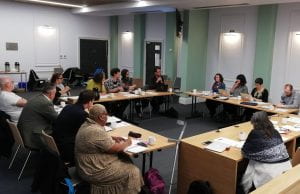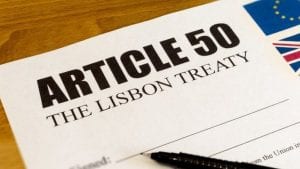By Dr Clair Gammage and Prof Phil Syrpis (University of Bristol Law School)
 Introduction
Introduction
The 585-page Draft Agreement on the Withdrawal of the UK from the EU (“the Withdrawal Agreement”), agreed on 14 November, paves the way for the UK’s departure from the EU on 20 March 2019. The Withdrawal Agreement and the associated Political Declaration on the Future UK-EU Relationship, agreed earlier today, represent the culmination of the Article 50 negotiations between the UK and the EU. The Withdrawal Agreement includes provisions on citizens’ rights (Part Two), provisions governing separation (Part Three), provisions on the transition or implementation period (Part Four), financial provisions (i.e. the divorce bill) (Part Five), and institutional provisions, including a dispute settlement system under a newly-created Joint Committee (Part Six); together with Protocols on Ireland, Cyprus and Gibraltar. For a comprehensive analysis of the Agreement as a whole, see Steve Peers’ analysis, here.
Our intention here is not to engage with the unfolding political drama, but rather to analyse some of the key legal provisions of the Withdrawal Agreement, which explain the way in which the withdrawal process will operate. We begin with a couple of caveats. First, the Withdrawal Agreement is a long document, and we have had only a week to read and think about it. It is not easy to work out how the various parts of the Agreement and the Political Declaration are intended to fit together. Second, this post only purports to provide a broad-brush legal analysis of the Withdrawal Agreement; there are deeper complexities lurking within many of its provisions. We have chosen to focus on those areas in which we have the greatest expertise. Our hope is that this post will provoke a reaction among those keen to participate in both legal, and more political, discussion of the Withdrawal Agreement, and that it will help to generate greater understanding of the proposed terms of the UK’s exit from the EU.
On the basis of our analysis of the deal, we conclude that it should be rejected. It is a better outcome than ‘no deal’. But, it is significantly worse than the status quo. There are significant reasons why not only Brexiters but also remainers should be concerned. (more…)
 The killing of the Iranian military strategist Qasem Soleimani at the start of 2020 may not have much, if any, direct effect on terrorism in the UK. But it was always unlikely that threats from jihadis, dissident Irish republicans and the far right would decline significantly as the new decade unfolds. Dealing with these threats must remain a top political priority.
The killing of the Iranian military strategist Qasem Soleimani at the start of 2020 may not have much, if any, direct effect on terrorism in the UK. But it was always unlikely that threats from jihadis, dissident Irish republicans and the far right would decline significantly as the new decade unfolds. Dealing with these threats must remain a top political priority.

 This blog is written after the
This blog is written after the 


